初中英语短语易混总结
- 格式:docx
- 大小:28.26 KB
- 文档页数:16
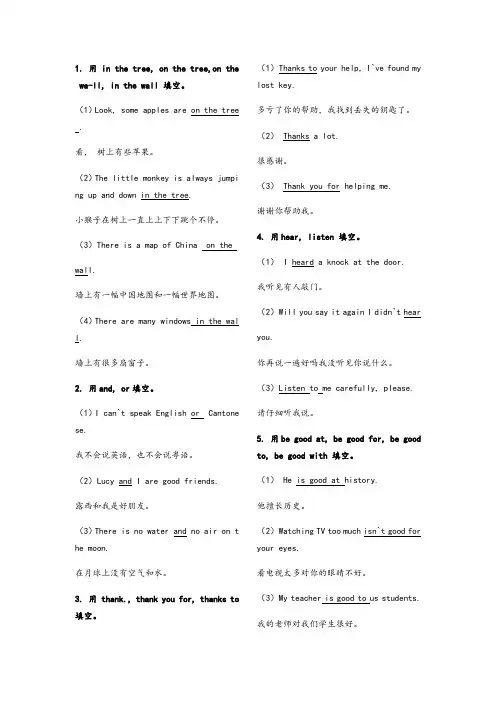
1. 用 in the tree, on the tree,on the wa-ll, in the wall 填空。
(1)Look, some apples are on the tree .看,树上有些苹果。
(2)The little monkey is always jumpi ng up and down in the tree.小猴子在树上一直上上下下跳个不停。
(3)There is a map of China on thewall.墙上有一幅中国地图和一幅世界地图。
(4)There are many windows in the wal l.墙上有很多扇窗子。
2. 用and, or填空。
(1)I can`t speak English or Cantone se.我不会说英语,也不会说粤语。
(2)Lucy and I are good friends.露西和我是好朋友。
(3)There is no water and no air on t he moon.在月球上没有空气和水。
3. 用 thank., thank you for, thanks to 填空。
(1)Thanks to your help, I`ve found my lost key.多亏了你的帮助,我找到丢失的钥匙了。
(2) Thanks a lot.很感谢。
(3) Thank you for helping me.谢谢你帮助我。
4. 用hear, listen 填空。
(1) I heard a knock at the door.我听见有人敲门。
(2)Will you say it again I didn`t hearyou.你再说一遍好吗我没听见你说什么。
(3)Listen to me carefully, please.请仔细听我说。
5. 用be good at, be good for, be good to, be good with 填空。
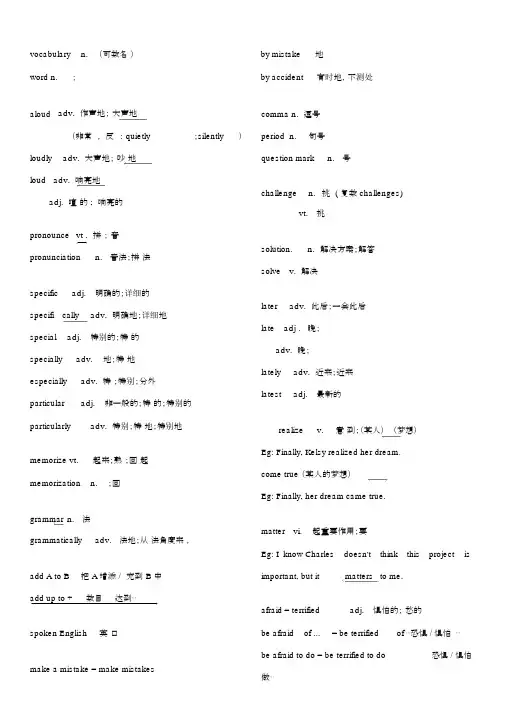
vocabulary n. (可数名)by mistake地word n.;by accident有时地,不测处aloud adv. 作声地;大声地comma n.逗号(非常,反: quietly;silently)period n.句号loudly adv. 大声地;吵地question mark n. 号loud adv. 响亮地adj. 喧的;响亮的challenge n.挑 ( 复数 challenges)vt.挑pronounce vt . 拼;音pronunciation n. 音法;拼法specific adj.明确的;详细的specifi cally adv. 明确地;详细地special adj.特别的;特的specially adv. 地;特地especially adv. 特;特别;分外particular adj.非一般的;特的;特别的particularly adv. 特别;特地;特别地memorize vt.起来;熟;回起memorization n. ;回grammar n. 法grammatically adv. 法地;从法角度来,add A to B把A增添/充到B中add up to +数目达到⋯spoken English英口make a mistake = make mistakes solution.n. 解决方案;解答solve v. 解决later adv. 此后;一会此后late adj .晚;adv. 晚;lately adv. 近来;近来latest adj.最新的realize v.意到;(某人)(梦想)Eg: Finally, Kelsy realized her dream.come true (某人的梦想)Eg: Finally, her dream came true.matter vi.起重要作用;要Eg: I know Charles doesn't think this project is important, but it matters to me.afraid = terrified adj.惧怕的;愁的be afraid of ... = be terrified of ⋯恐惧 / 惧怕⋯be afraid to do = be terrified to do恐惧/惧怕做⋯laugh at⋯= make fun of⋯讥笑/嘲讽⋯complete vt.达成adj.完好的;完好的completely adv 完好地childhood n. 童年on duty班;日break off忽然中断;中断break down抛;出缺点break up分手take a ride兜take care小心,注意;珍重sb.be sure of sth.sb. be sure to do sth.sb. Be sure that⋯it is certain(无疑;确立) thatcertain adj.某,某些,某个Eg:friendly的比是friendlier,最高是friendliestcomic n.漫画,画志patient adj.耐心的n.病人patiently adv. 耐心地at the end of⋯in the endtake pride in⋯= be proud of⋯with pleasure能够用来答方的求,Eg: “Would you mind holding the door open forme, please ” “Oh, with pleasure.”It ’ s a pleasure.或It’s my pleasure.是用往返答感的答。

中考英语常考易混单词1.abroad 到国外go abroad 出国board 板on board 在船[火车,飞机,汽车]上; 已装船2.across介词,表面穿过walk across the roadcross 动词,越过; 横过cross the roadthrough 介词,空间穿过go through the windowpast 介词,经过walk past the post officepass 动词,通过; 走过pass the test3.alive活着的I am still alive.live 形容词或副词,现场直播is covered livelive 动词,居住live in the citylively活泼的make his class lively and interesting living 名词,生计make a living 维持生活,谋生a living room,起居室,客厅4.lonely 形容词,孤独feel lonelylonely 形容词,孤零零a lonely housealone 形容词或副词,独自live alonealong 介词,沿着walk along the street5.asleep睡着的fall asleepsleepy困倦的feel sleepy6.fall 落下,倒fall downfell:fall的过去式 (fall—fell---fallen) feel觉得 feel sleepy/tired---过去式felt 7.badly — worseJim acted badly, but Tom did worse. well—betterHe plays football well and his father does better.8.boring, interesting, exciting, tiring…修饰物an interesting storybored, interested, excited, tired…修饰人feel bored9.borrow借进(以句子主语为参照物)May I borrow your pen?lend借出(以句子主语为参照物)Could you lend me some money?keep 借一段时间How long can I keep the magazine?10.both两者都Both of his parents are workers.all三者以上都All of my classmates are from China. neither两者都不Neither of my hands is clean.none没有一个(三者及以上)None of the four apples is/are red. nothing 什么都没有There’s nothi ng in the fridge.11.caretake care ofcareful 形,仔细的be careful with firecarefully 副,仔细地listen carefullycareless 形,粗心的a careless studentcarelessly 副,粗心地drive carelesslycarelessness 名,粗心Your carelessness led to the mistake. 12.take带走(以说话者为中心)remember to take a raincoatbring带来(以说话者为中心)bring your book herecarry拿,无方向Could you help me carry the books?13.close动词,关闭close the doorclose 形容词,亲密的my closest friendclosed形,关着的keep the door closed14.closely副,密切地work closely with us15.brave形,勇敢的He is brave enough to save the old man. courage 名,勇气have the courage to tell him the bad news bravely 副,勇敢地face the difficulties bravely16.dead形容词,死的have been deaddie动,死亡die of hungerdeath名,死亡the death of his pet makes him so sad. 17.especially副,尤其He is good at all subjects, especially maths.specially副,专门The pen is specially designed for the boy. special形,特殊的a special day18.except除了All the students except Tom will go for a school trip.expect期待You are expected to bring it back when you return.19.excited形,激动的,修饰人feel excitedexciting形,激动人心的,修饰物an exciting filmexcitedly 副词,修饰动画shouted excitedlyexcitement名词shout with excitement20.a little一些,修饰不可数名词a little moneya few一些,修饰可数名词a few treeslittle几乎没有,修饰不可数名词There’s little water in the glass, is it? few几乎没有,修饰可数名词so few students21.form 形成form a good reading habitfrom 从……22.France法国/ French 法语German德国的/ Germany 德国23.hard努力work hardhardly几乎不The boy hardly does his homework.24.healthy健康的keep healthyhealth健康it’s good for your healthhealthily健康地eat healthily25.if如果主将从现If he comes, I’ll call you.是否I don’t know if he will come here. whether是否(如与or连用,则用)I wonder whether he’ll come or not. weather 天气What will the weather be like tomorrow?26.include 动词,包括The list includes the names of many famous writers.including 介词,包括They have many pets, including three cats.27.invent动词发明Edison invented a lot of things. invention名词发明The invention made much difference to humans.inventor名词发明者Edison was a great inventor.st 上一个的last year;最后的make her last apperance动词,持续The meeting will last one and a half hours. lasting 形,持久的a lasting value29.lie名词,谎言tell a lie动词,说谎He is always lying to us.动词,位于Japan lies to the east of China.动词,躺,平放He likes lying on the grass.躺,平放;位于:lie—lay---lain说谎:lie-lied-lied30.luck名,运气good lucklucky 形,幸运的a lucky numberluckily 副,幸运的是Luckily, we got better marks.unlucky/unluckily31.noise名,噪音Don’t make any noise.noisy 形,吵闹的much too noisynoisily 副,吵闹地talk noisily32.noise 名词,噪音sound 名词,声音We sat listening to the sound of the waves sound 动词,听起来The music sounds beautiful.voice 名词,嗓音The singer has a sweet voice.33.provide提供provide a chance for the boy=provide the boy with a chanceoffer 提供offer a chance to the boy=offer the boy a chance34.other别的,加名词other studentsanother另一个I don’t like the pair of shoes, would you like to show me another pair?the other 两个中的另一个,常用one…the otherHere is a shoe, where’s the other one? others= other+名词35.over/ under年龄的上下above/ below温度,楼层的上下36.peace名词,和平love peacepeaceful形,宁静的a peaceful villagepeacefully 副,和平地we hope to solve the problem peacefully.37.pleasure名,乐意。
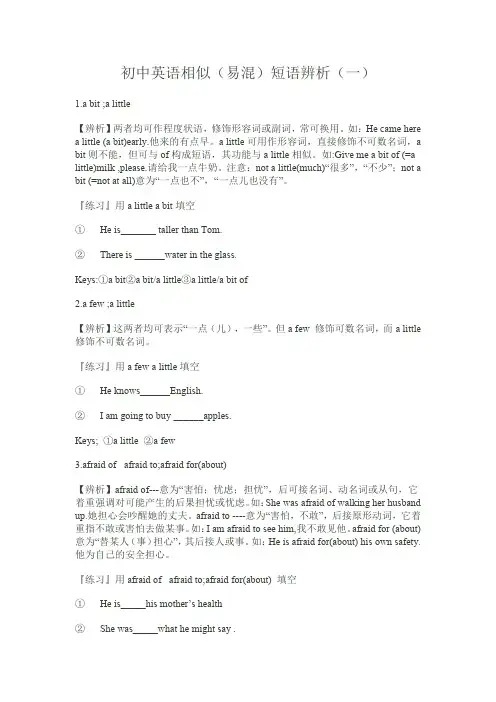
初中英语相似(易混)短语辨析(一)1.a bit ;a little【辨析】两者均可作程度状语,修饰形容词或副词,常可换用。
如:He came here a little (a bit)early.他来的有点早。
a little可用作形容词,直接修饰不可数名词,a bit则不能,但可与of构成短语,其功能与a little相似。
如:Give me a bit of (=a little)milk ,please.请给我一点牛奶。
注意:not a little(much)“很多”,“不少”;not a bit (=not at all)意为“一点也不”,“一点儿也没有”。
『练习』用a little a bit填空①He is_______ taller than Tom.②There is ______water in the glass.Keys:①a bit②a bit/a little③a little/a bit of2.a few ;a little【辨析】这两者均可表示“一点(儿),一些”。
但a few 修饰可数名词,而a little 修饰不可数名词。
『练习』用a few a little填空①He knows______English.②I am going to buy ______apples.Keys; ①a little ②a few3.afraid of afraid to;afraid for(about)【辨析】afraid of---意为“害怕;忧虑;担忧”,后可接名词、动名词或从句,它着重强调对可能产生的后果担忧或忧虑。
如:She was afraid of walking her husband up.她担心会吵醒她的丈夫。
afraid to ----意为“害怕,不敢”,后接原形动词,它着重指不敢或害怕去做某事。
如:I am afraid to see him,我不敢见他。
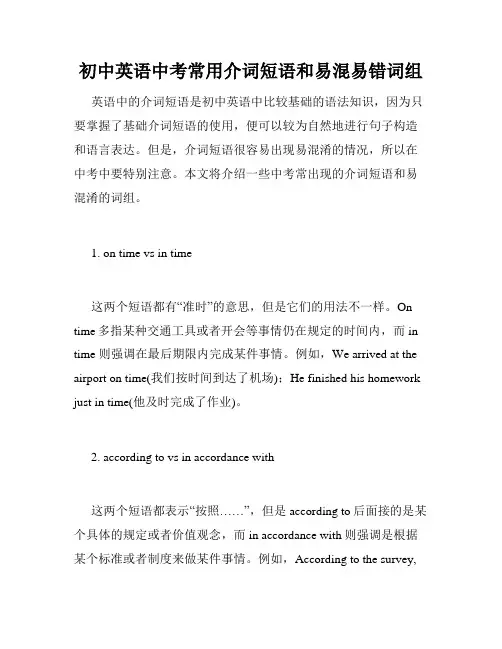
初中英语中考常用介词短语和易混易错词组英语中的介词短语是初中英语中比较基础的语法知识,因为只要掌握了基础介词短语的使用,便可以较为自然地进行句子构造和语言表达。
但是,介词短语很容易出现易混淆的情况,所以在中考中要特别注意。
本文将介绍一些中考常出现的介词短语和易混淆的词组。
1. on time vs in time这两个短语都有“准时”的意思,但是它们的用法不一样。
On time多指某种交通工具或者开会等事情仍在规定的时间内,而in time 则强调在最后期限内完成某件事情。
例如,We arrived at the airport on time(我们按时间到达了机场);He finished his homework just in time(他及时完成了作业)。
2. according to vs in accordance with这两个短语都表示“按照……”,但是according to后面接的是某个具体的规定或者价值观念,而in accordance with则强调是根据某个标准或者制度来做某件事情。
例如,According to the survey,more and more people prefer to work from home(根据调查,越来越多的人喜欢在家工作); In accordance with company regulations, smokers may only smoke in designated areas(根据公司规定,吸烟者只能在指定区域吸烟)。
3. in spite of vs despite这两个短语都表示“尽管”,但in spite of通常用来表示困难或者阻力,而despite则强调不受阻碍的情况。
例如,In spite of the heavy rain, we still went hiking(尽管下着大雨,我们还是去远足了);Despite the fact that he was tired, he continued to work(尽管很累,他还是继续工作)。
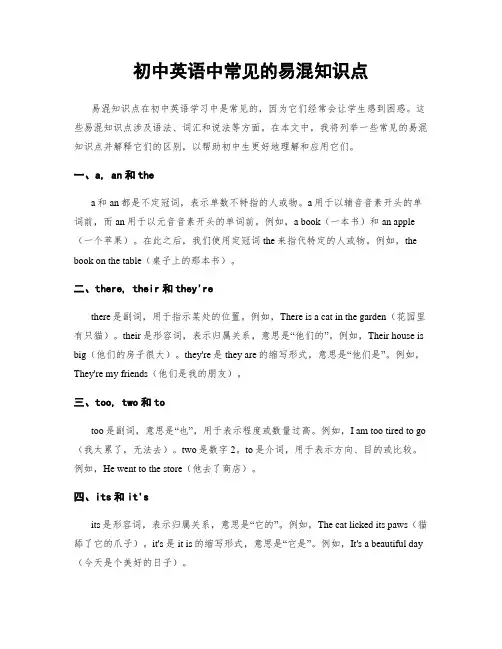
初中英语中常见的易混知识点易混知识点在初中英语学习中是常见的,因为它们经常会让学生感到困惑。
这些易混知识点涉及语法、词汇和说法等方面。
在本文中,我将列举一些常见的易混知识点并解释它们的区别,以帮助初中生更好地理解和应用它们。
一、a, an和thea和an都是不定冠词,表示单数不特指的人或物。
a用于以辅音音素开头的单词前,而an用于以元音音素开头的单词前。
例如,a book(一本书)和an apple (一个苹果)。
在此之后,我们使用定冠词the来指代特定的人或物。
例如,the book on the table(桌子上的那本书)。
二、there, their和they'rethere是副词,用于指示某处的位置。
例如,There is a cat in the garden(花园里有只猫)。
their是形容词,表示归属关系,意思是“他们的”。
例如,Their house is big(他们的房子很大)。
they're是they are的缩写形式,意思是“他们是”。
例如,They're my friends(他们是我的朋友)。
三、too, two和totoo是副词,意思是“也”,用于表示程度或数量过高。
例如,I am too tired to go (我太累了,无法去)。
two是数字2。
to是介词,用于表示方向、目的或比较。
例如,He went to the store(他去了商店)。
四、its和it'sits是形容词,表示归属关系,意思是“它的”。
例如,The cat licked its paws(猫舔了它的爪子)。
it's是it is的缩写形式,意思是“它是”。
例如,It's a beautiful day (今天是个美好的日子)。
五、your和you'reyour是形容词,表示归属关系,意思是“你的”。
例如,Is this your book?(这是你的书吗?)。
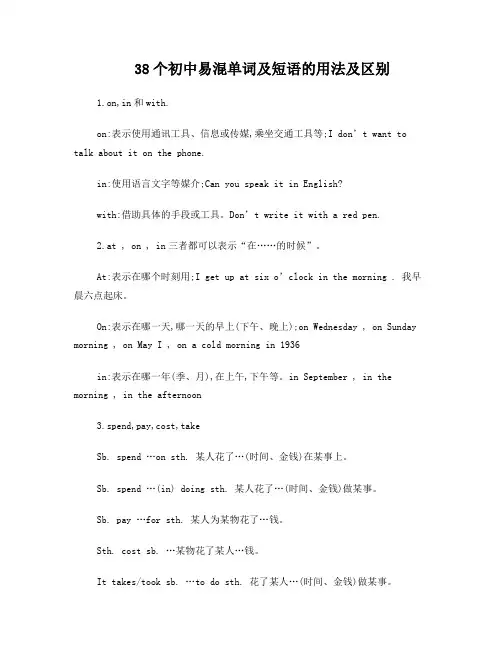
38个初中易混单词及短语的用法及区别1.on,in和with.on:表示使用通讯工具、信息或传媒,乘坐交通工具等;I don’t want to talk about it on the phone.in:使用语言文字等媒介;Can you speak it in English?with:借助具体的手段或工具。
Don’t write it with a red pen.2.at , on , in三者都可以表示“在……的时候”。
At:表示在哪个时刻用;I get up at six o’clock in the morning . 我早晨六点起床。
On:表示在哪一天,哪一天的早上(下午、晚上);on Wednesday , on Sunday morning , on May I , on a cold morning in 1936in:表示在哪一年(季、月),在上午,下午等。
in September , in the morning , in the afternoon3.spend,pay,cost,takeSb. spend …on sth. 某人花了…(时间、金钱)在某事上。
Sb. spend …(in) doing sth. 某人花了…(时间、金钱)做某事。
Sb. pay …for sth. 某人为某物花了…钱。
Sth. cost sb. …某物花了某人…钱。
It takes/took sb. …to do sth. 花了某人…(时间、金钱)做某事。
4.too much, too many, much tootoo much + 不可数名词too many + 可数名词much too + 形容词5.not …until &untilnot …until 直到…才…(主句动词是短暂性动词)until 一直到…(主句中使用延续性动词)6.few, a few; little , a little. 虽然都表示“少”,但(1)few, a few是可数的, little, a little是不可数的。
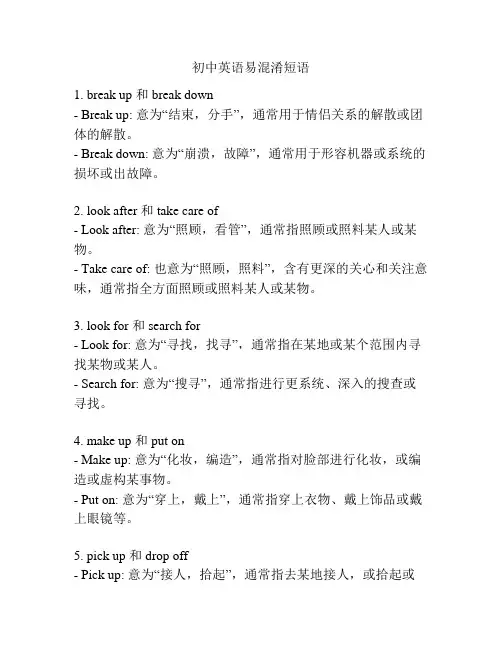
初中英语易混淆短语
1. break up 和 break down
- Break up: 意为“结束,分手”,通常用于情侣关系的解散或团体的解散。
- Break down: 意为“崩溃,故障”,通常用于形容机器或系统的损坏或出故障。
2. look after 和 take care of
- Look after: 意为“照顾,看管”,通常指照顾或照料某人或某物。
- Take care of: 也意为“照顾,照料”,含有更深的关心和关注意味,通常指全方面照顾或照料某人或某物。
3. look for 和 search for
- Look for: 意为“寻找,找寻”,通常指在某地或某个范围内寻找某物或某人。
- Search for: 意为“搜寻”,通常指进行更系统、深入的搜查或寻找。
4. make up 和 put on
- Make up: 意为“化妆,编造”,通常指对脸部进行化妆,或编造或虚构某事物。
- Put on: 意为“穿上,戴上”,通常指穿上衣物、戴上饰品或戴上眼镜等。
5. pick up 和 drop off
- Pick up: 意为“接人,拾起”,通常指去某地接人,或拾起或
捡起某物。
- Drop off: 意为“送人,放下”,通常指把某人送到某地,或放下或丢下某物。
6. turn on 和 switch on
- Turn on: 意为“打开”,通常指打开电器或开关的动作。
- Switch on: 也意为“打开”,特别指通过切换开关打开电器或电源。
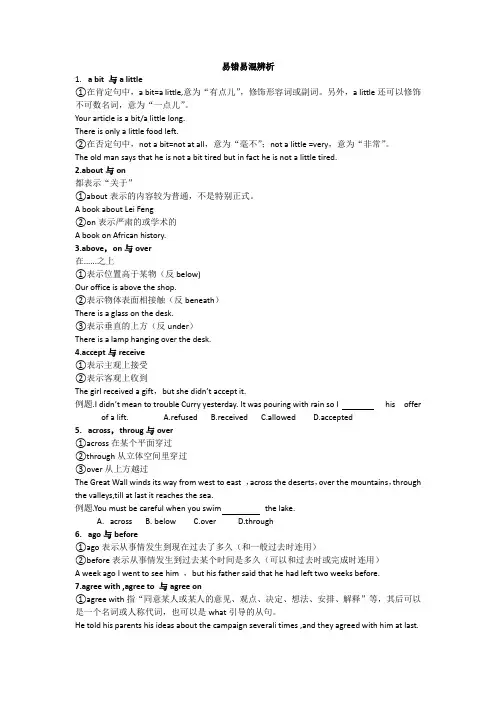
易错易混辨析1. a bit 与a little①在肯定句中,a bit=a little,意为“有点儿”,修饰形容词或副词。
另外,a little还可以修饰不可数名词,意为“一点儿”。
Your article is a bit/a little long.There is only a little food left.②在否定句中,not a bit=not at all,意为“毫不”;not a little =very,意为“非常”。
The old man says that he is not a bit tired but in fact he is not a little tired.2.about与on都表示“关于”①about表示的内容较为普通,不是特别正式。
A book about Lei Feng②on表示严肃的或学术的A book on African history.3.above,on与over在......之上①表示位置高于某物(反below)Our office is above the shop.②表示物体表面相接触(反beneath)There is a glass on the desk.③表示垂直的上方(反under)There is a lamp hanging over the desk.4.accept与receive①表示主观上接受②表示客观上收到The girl received a gift,but she didn’t accept it.例题.I didn’t mean to trouble Curry yesterday. It was pouring with rain so I his offer of a lift. A.refused B.received C.allowed D.accepted5.across,throug与over①across在某个平面穿过②through从立体空间里穿过③over从上方越过The Great Wall winds its way from west to east ,across the deserts,over the mountains,through the valleys,till at last it reaches the sea.例题.You must be careful when you swim the lake.A.acrossB. belowC.overD.through6.ago与before①ago表示从事情发生到现在过去了多久(和一般过去时连用)②before表示从事情发生到过去某个时间是多久(可以和过去时或完成时连用)A week ago I went to see him ,but his father said that he had left two weeks before.7.agree with ,agree to 与agree on①agree with指“同意某人或某人的意见、观点、决定、想法、安排、解释”等,其后可以是一个名词或人称代词,也可以是what引导的从句。
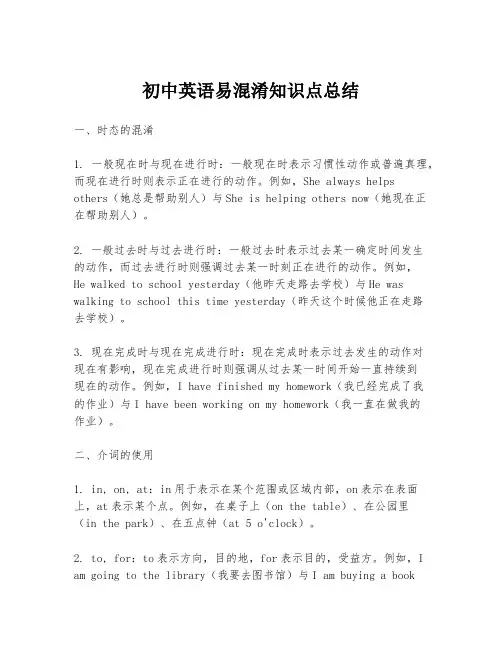
初中英语易混淆知识点总结一、时态的混淆1. 一般现在时与现在进行时:一般现在时表示习惯性动作或普遍真理,而现在进行时则表示正在进行的动作。
例如,She always helpsothers(她总是帮助别人)与She is helping others now(她现在正在帮助别人)。
2. 一般过去时与过去进行时:一般过去时表示过去某一确定时间发生的动作,而过去进行时则强调过去某一时刻正在进行的动作。
例如,He walked to school yesterday(他昨天走路去学校)与He was walking to school this time yesterday(昨天这个时候他正在走路去学校)。
3. 现在完成时与现在完成进行时:现在完成时表示过去发生的动作对现在有影响,现在完成进行时则强调从过去某一时间开始一直持续到现在的动作。
例如,I have finished my homework(我已经完成了我的作业)与I have been working on my homework(我一直在做我的作业)。
二、介词的使用1. in, on, at:in用于表示在某个范围或区域内部,on表示在表面上,at表示某个点。
例如,在桌子上(on the table)、在公园里(in the park)、在五点钟(at 5 o'clock)。
2. to, for:to表示方向,目的地,for表示目的,受益方。
例如,I am going to the library(我要去图书馆)与I am buying a bookfor you(我为你买本书)。
三、冠词的误用1. the, a, an:定冠词the用于特指某个已知的人或物,不定冠词a/an用于泛指。
例如,The sun rises in the east(太阳从东方升起)是固定搭配,而A cat is a lovely pet(猫是一种可爱的宠物)则泛指任何一只猫。
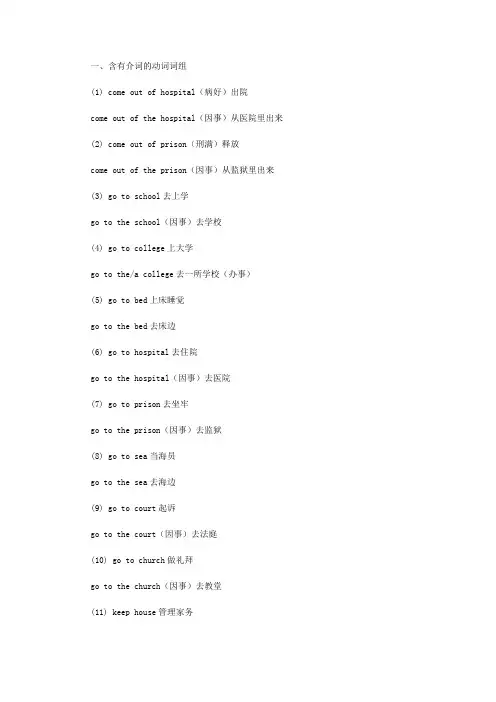
一、含有介词的动词词组(1) come out of hospital(病好)出院come out of the hospital(因事)从医院里出来(2) come out of prison(刑满)释放come out of the prison(因事)从监狱里出来(3) go to school去上学go to the school(因事)去学校(4) go to college上大学go to the/a college去一所学校(办事)(5) go to bed上床睡觉go to the bed去床边(6) go to hospital去住院go to the hospital(因事)去医院(7) go to prison去坐牢go to the prison(因事)去监狱(8) go to sea当海员go to the sea去海边(9) go to court起诉go to the court(因事)去法庭(10) go to church做礼拜go to the church(因事)去教堂(11) keep house管理家务keep the house守在家里(12) take place发生take the place代替二、有无冠词,意义无多大区别的介词词组(1)at(the)most至多(2)at(the)first起初(3)all(the)day 整天(4)catch(a)cold感冒(5)in(the)future 将来(6)in(the)memory of纪念(7)go to(the)office 上班,去办公室(8)go to(the)market 赶集,去市场(9)on(a)holiday 在度假(10)(the)day before yesterday 前天(11)(the)most of 大多数(12)with(a)smiling face 面带微笑。
初中英语易混易错词汇总结初中英语易混易错词汇总结第一部分:易用错的词第一部分:易用错的词1. clothes, cloth, clothingclothes 统指各种衣服,谓语动词永远是复数,统指各种衣服,谓语动词永远是复数, cloth 指布,为不可数名词指布,为不可数名词 clothing 服装的总称,指一件衣服用a piece of, an article of 2. amount, numberamount 后接不可数名词,后接不可数名词, number 后接可数名词后接可数名词 a number of students 3. family, house, homehome 家,包括住处和家人,house 房子,住宅,family 家庭成员. My family is a happy one.4. sound, voice, noise sound 自然界各种各样的声音,voice 人的嗓音,noise 噪音I hate the loud noise outside.5. photo, picture, drawing photo 用照相机拍摄的照片,picture 可指相片,图片,电影片,drawing 画的画画的画 Let's go and see a good picture.6. vocabulary, word vocabulary 词汇,一个人拥有的单词量,word 具体的单词He has a large vocabulary.7. population, people population 人口,人数,people 具体的人具体的人 China has a large population.8. road, street, path, way road 具体的公路,马路,street 街道,path 小路,小径,way 道路,途径道路,途径 take this road; in the street, show me the way to the museum. 9. course, subjectcourse 课程(可包括多门科目),subject 科目(具体的学科)a summer course 10. custom, habitcustom 传统风俗,习俗,也可指生活习惯,后接to do , habit 生活习惯,习惯成自然,后接of doing. I've got the habit of drinking a lot.11. cause, reason cause 指造成某一事实或现象的直接原因,后接of sth./doing sth ,reason 用来解释某种现象或结果的理由,后接for sth./doing sth. the reason for being late 12. exercise, exercises, practice exercise 运动,锻炼(不可数),exercises 练习(可数),practice (反复做的)练习练习 Practice makes perfect.13. class, lesson 作"课"解时,两者可以替换.指课文用lesson.指班级或全体学生用class. lesson 6; class 5 14. speech, talk, lecturespeech 指在公共场所所做的经过准备的较正式的演说,talk 日常生活中的一般的谈话,讲话,lecture 学术性的演讲,讲课学术性的演讲,讲课a series of lecture on… 15. officer, officialofficer 部队的军官,official 政府官员政府官员 an army officer 16. work, job二者均指工作。
初中英语相似(易混)短语辨析(一)1.a bit ;a little【辨析】两者均可作程度状语,修饰形容词或副词,常可换用。
如:He came here a little (a bit)early.他来的有点早。
a little可用作形容词,直接修饰不可数名词,a bit则不能,但可与of构成短语,其功能与a little相似。
如:Give me a bit of (=a little)milk ,please.请给我一点牛奶。
注意:not alittle(much)“很多”,“不少”;not a bit (=not at all)意为“一点也不”,“一点儿也没有”。
『练习』用a little a bit填空① He is_______ taller than Tom.② There is ______water in the glass.Keys:①a bit②a bit/a little③a little/a bit of2.a few ;a little【辨析】这两者均可表示“一点(儿),一些”。
但a few 修饰可数名词,而a little 修饰不可数名词。
『练习』用a few a little填空① He knows______English.② I am going to buy ______apples.Keys; ①a little ②a few3.afraid of afraid to;afraid for(about)【辨析】afraid of---意为“害怕;忧虑;担忧”,后可接名词、动名词或从句,它着重强调对可能产生的后果担忧或忧虑。
如:She was afraid of walking her husband up.她担心会吵醒她的丈夫。
afraid to ----意为“害怕,不敢”,后接原形动词,它着重指不敢或害怕去做某事。
如:I am afraid to see him,我不敢见他。